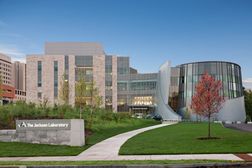
Processing Your Payment
Please do not leave this page until complete. This can take a few moments.
- News
-
Editions
View Digital Editions
Biweekly Issues
- May 13, 2024
- April 29, 2024
- April 15, 2024
- April 1, 2024
- March 18, 2024
- March 4, 2024
- February 19, 2024
- February 5, 2024
- January 22, 2024
- + More
Special Editions
- Lists
- Viewpoints
- HBJ Events
- Business Calendar
- Custom Content
One of Jackson Laboratory’s first Farmington spinoffs aims to create predictive tests for severe newborn illnesses
 HBJ PHOTO | ROBERT STORACE
George Weinstock (left), General Biomics’ founder, stands in the company’s Farmington-based laboratory next to a PCR machine, which performs COVID-19 virus testing. Standing to the right is General Biomics Lab Manager Kathleen Teter.
HBJ PHOTO | ROBERT STORACE
George Weinstock (left), General Biomics’ founder, stands in the company’s Farmington-based laboratory next to a PCR machine, which performs COVID-19 virus testing. Standing to the right is General Biomics Lab Manager Kathleen Teter.
A Farmington-based bioscience startup is hoping its technology can help with the early detection of newborn illnesses, saving lives and possibly billions of dollars in spending on healthcare services.
General Biomics Inc.’s goal is to apply knowledge of the microbiome (microorganisms that exist in a particular environment) and its impact on illnesses that affect newborns, most notably late-onset sepsis.
The company is developing patentable tests to predict the occurrence of maladies prior to the start of symptoms.
Specifically, the tests take a sample of an infant’s gut microbes. Artificial intelligence is then used to determine if the microbes are healthy. If they are not healthy, then interventions — such as antibiotics or probiotics — are prescribed.
There are about 400,000 at-risk patients in the neonatal intensive care unit and 130,000 high-risk infants in the pediatric intensive care unit in the U.S., suffering from severe illnesses that range from late-onset sepsis to serious gastrointestinal problems that mostly affect premature babies. The costs attributable to these maladies are about $25 billion, according to Steve Lombardi, General Biomics’ executive chairman.

Lombardi said his company’s data shows hospitals can save up to two-thirds of those costs and reduce mortality by 90% by predicting maladies prior to the onset of symptoms.
“What the technology can do is allow us to quickly elucidate the microorganisms that are responsible for virtually any human disease,” Lombardi said. “It’s the next phase of human medicine; the impact of what we can do can be immense and it can save lives.”
Spinoff count
General Biomics is newsworthy for more than just the science and potential impact it could have. It is also one of the first spinoffs to come out of Jackson Laboratory’s Farmington campus.
The Maine-based genomics research institute was approved for nearly $300 million in taxpayer funding in 2011 to build a 185,000-square-foot research center in Farmington and grow its ranks and research.
General Biomics was founded by George Weinstock, who was a professor and director of microbial genomics at Jackson Laboratory from 2010 until Jan. 4, when he retired from full-time employment to devote his attention to growing General Biomics.
Since the debut of its Farmington facility in 2014, Jackson Laboratory has named two spinoffs. The other is Boundless Bio, which is developing cancer therapies.
It’s not clear how that number of startups would meet the expectations of state policymakers who approved Jackson Laboratory’s funding more than a decade ago.

A 2011 economic analysis of the Jackson Laboratory investment — performed by former Department of Economic and Community Development economist Stan McMillan — projected the nonprofit research organization would produce 2,762 direct spinoff hires by the end of 2022.
The spinoffs category, according to the report, included jobs created by new startups, and jobs migrating to Connecticut or expanding at existing in-state firms because of collaborations, subcontracts or a clustering effect from Jackson Laboratory’s presence.
Jackson Laboratory couldn’t provide HBJ the direct number of spinoff hires it’s created in the state so far. However, a 2021 economic impact report generated by the research institute said it had an “indirect and induced impact” of $55.7 million that supported 691 jobs.
LuAnn Ballesteros, Jackson Laboratory’s vice president of external and government affairs, said the research organization hopes to grow its number of startups over the next decade, but creating more than 2,700 spinoff jobs by the 10-year mark “isn’t realistic.”

“This all takes time,” she said. “We are a basic research institution. It’s within that process that you’ve got to have your basic research discoveries … made and that takes years.”
It’s true that there are long lead times in moving scientific discoveries out of the lab.
For example, it takes at least 10 years on average for a new medicine to go from initial discovery to the marketplace, with clinical trials alone taking six to seven years, according to the Pharmaceutical Research and Manufacturers of America, an industry trade group.
Beyond startup activity, Ballesteros said Jackson Laboratory has had a significant economic impact on the state.
It surpassed its 10-year hiring goal of at least 300 employees in Farmington in just four years in 2018. As a result, Connecticut Innovations (CI) agreed that year to forgive $165.9 million in loans to Jackson Laboratory.
Today, Jackson Laboratory has 450 employees in Farmington, a 21% increase from a year ago driven by increased grant and institutional funding, Ballesteros said.
Its employees are also well-paid. Jackson Laboratory workers had an average salary of $97,400 last year.
Also in 2021, the organization’s $106 million in Connecticut operational revenue represented a 375% increase since 2015 and 150% increase compared to 2019, Ballesteros said.
“What Jackson Laboratory does has a ripple effect in the economy of the state overall,” Ballesteros said. “Jackson is a catalyst for scientific innovation and economic growth in Connecticut. We are pursuing new collaborations and initiatives that will play an important part in transforming human health and helping establish Connecticut as the bioscience center of excellence.”
Product development
General Biomics has a licensing agreement with Jackson Laboratory and is working with the Women & Infants Hospital in Providence, Rhode Island, whose patients are providing clinical samples (saliva and stool) that will allow the startup to develop and test its predictive technology for newborn illnesses.
Weinstock, 73, said General Biomics received about $400,000 in seed money at the end of 2021 to help kick-start the new company. He also invested $100,000 of his own money and took out $25,000 in loans.
In addition, Weinstock said the company is in ongoing discussions with “about half-a-dozen investors.”
General Biomics currently has two employees (Weinstock and Kathleen Teter, its lab manager) who work out of the UConn Technology Incubation Program in Farmington. The company expects to have about a dozen employees by the end of 2023, Weinstock said, as it grows its product development and clinical trials staff.
The company is also looking at other potential commercial applications, including a test to predict children who may suffer from future severe asthma attacks.
“We believe we can have a home test for this in 2023,” said Weinstock, who is also on the faculty of UConn Health. “We recently published a paper showing that there are a handful of bacteria whose abundance is normal to high in kids who could have a severe asthma attack. In layman’s terms, you want to find out who is going to have a severe (asthma) attack before they have that attack. We think we can develop a home test for these specific bacteria. This would be kind of like the home tests that are out there now for COVID.”
Future projects could revolve around predictive tests for diabetes, multiple sclerosis and other metabolic diseases, Weinstock said.
Prior to joining Jackson Laboratory, Weinstock was the associate director of the Genome Institute at Washington University in St. Louis.
He also was co-director of the Human Genome Sequencing Center at Baylor College of Medicine in Houston, where he was also a professor of molecular and human genetics.
Related Content

2022 Giving Guide
This special edition informs and connects businesses with nonprofit organizations that are aligned with what they care about. Each nonprofit profile provides a crisp snapshot of the organization’s mission, goals, area of service, giving and volunteer opportunities and board leadership.
Learn more
Subscribe
Hartford Business Journal provides the top coverage of news, trends, data, politics and personalities of the area’s business community. Get the news and information you need from the award-winning writers at HBJ. Don’t miss out - subscribe today.
Subscribe
2024 Book of Lists
Delivering Vital Marketplace Content and Context to Senior Decision Makers Throughout Greater Hartford and the State ... All Year Long!
Read Here-
2022 Giving Guide
This special edition informs and connects businesses with nonprofit organizations that are aligned with what they care about. Each nonprofit profile provides a crisp snapshot of the organization’s mission, goals, area of service, giving and volunteer opportunities and board leadership.
-
Subscribe
Hartford Business Journal provides the top coverage of news, trends, data, politics and personalities of the area’s business community. Get the news and information you need from the award-winning writers at HBJ. Don’t miss out - subscribe today.
-
2024 Book of Lists
Delivering Vital Marketplace Content and Context to Senior Decision Makers Throughout Greater Hartford and the State ... All Year Long!
ABOUT
ADVERTISE
NEW ENGLAND BUSINESS MEDIA SITES
No articles left
Get access now
In order to use this feature, we need some information from you. You can also login or register for a free account.
By clicking submit you are agreeing to our cookie usage and Privacy Policy
Already have an account? Login
Already have an account? Login
Want to create an account? Register
Get access now
In order to use this feature, we need some information from you. You can also login or register for a free account.
By clicking submit you are agreeing to our cookie usage and Privacy Policy
Already have an account? Login
Already have an account? Login
Want to create an account? Register








0 Comments